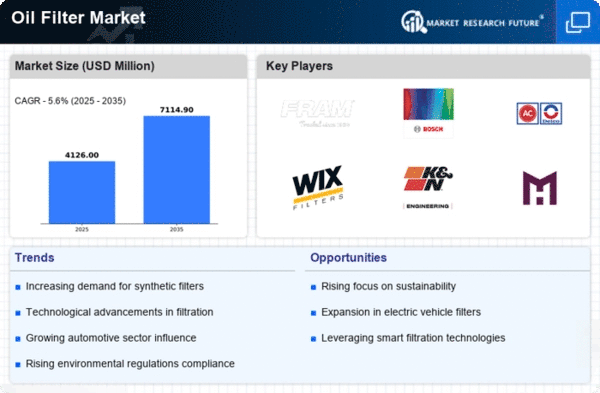Market Analysis
In-depth Analysis of Oil Filter Market Industry Landscape
The oil filter market is influenced by a multitude of factors that collectively shape its dynamics. One of the primary drivers is the global demand for automobiles. As the automotive industry continues to grow, the need for oil filters also escalates. The increasing number of vehicles on the road, coupled with the rising awareness about the importance of regular maintenance, propels the demand for oil filters. Additionally, stringent environmental regulations mandating the use of high-quality filters to reduce emissions contribute to market growth.
The oil filter market is also significantly impacted by the trends in the automotive aftermarket. As vehicles age, the frequency of oil changes and filter replacements rises. The aftermarket segment witnesses substantial demand for oil filters, driven by consumers' inclination towards maintaining their vehicles for prolonged periods. Moreover, innovations in filter technology, such as the development of advanced materials and improved filtration efficiency, play a pivotal role in influencing consumer choices and driving market growth.
Raw material prices and availability constitute another crucial factor affecting the oil filter market. The primary materials used in filter production, such as synthetic fibers, metal, and plastic, are susceptible to fluctuations in commodity prices. Consequently, manufacturers need to carefully manage their supply chain and production processes to mitigate the impact of raw material price volatility on the final product cost. Accessibility to raw materials also influences the overall market competitiveness, as manufacturers strive to maintain cost-effectiveness without compromising on filter quality.
Technological advancements in the oil filter industry contribute significantly to market evolution. The integration of smart technologies and sensors within filters enables real-time monitoring of filter performance and prompts timely replacements. This not only enhances the overall efficiency of the filtration process but also aligns with the growing trend of connected vehicles and IoT (Internet of Things) applications in the automotive sector. Consumers increasingly prefer technologically advanced filters that offer improved engine protection and longevity.
The geopolitical landscape and global economic conditions have a direct impact on the oil filter market. Fluctuations in crude oil prices, geopolitical tensions in oil-producing regions, and changes in government policies can influence the overall cost structure of the automotive industry. These factors, in turn, affect the purchasing power of consumers and their willingness to invest in vehicle maintenance, including the replacement of oil filters.
Environmental concerns and sustainability initiatives also contribute to shaping the oil filter market. The automotive industry is under increasing pressure to adopt eco-friendly practices, prompting the development of recyclable and biodegradable filter materials. Consumers are becoming more environmentally conscious, driving the demand for filters that align with sustainability goals. Manufacturers that proactively address these environmental considerations are likely to gain a competitive edge in the market.
In conclusion, the oil filter market is a complex ecosystem influenced by a myriad of factors. From global automotive trends and aftermarket dynamics to raw material costs, technological advancements, geopolitical factors, and environmental concerns, each element plays a role in shaping the market landscape. Manufacturers and stakeholders in the oil filter industry must stay attuned to these market factors to navigate the challenges and capitalize on the opportunities presented by this dynamic sector.


















Leave a Comment